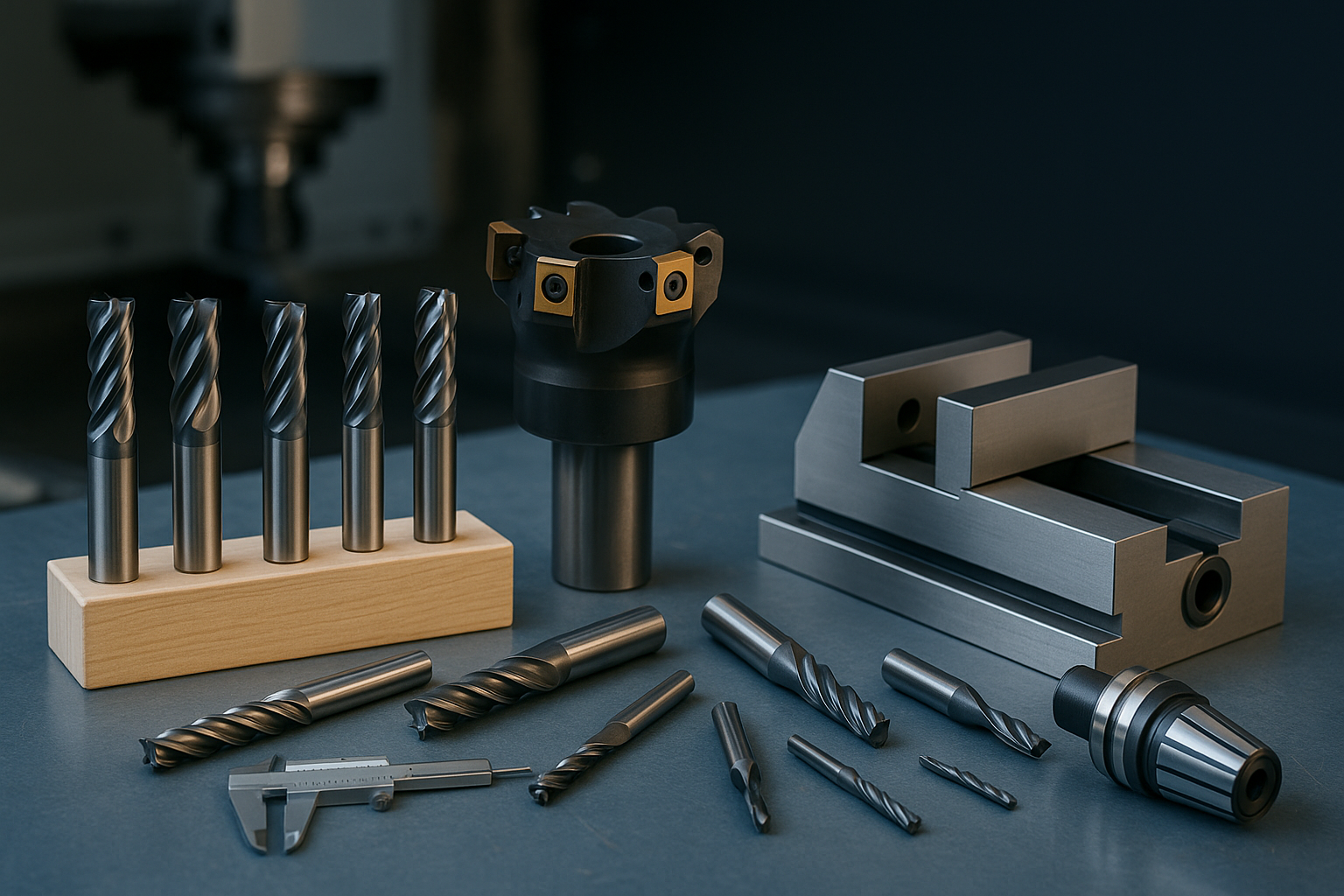T: 905-664-8661
info@cuttingtoolpickers.com

The Ultimate Starter Tooling List for New CNC Job Shops
Starting a CNC job shop is an exciting step—but knowing what tools to buy first can be overwhelming. Between budget limits and hundreds of tooling options, it's easy to overbuy or miss the essentials. Whether you're running your first job or quoting your tenth part, having a solid foundation of tools will keep you efficient and profitable from day one.
This guide lays out the starter CNC tooling list every new job shop should consider—focusing on versatility, cost-efficiency, and day-to-day practicality.
1. Solid Carbide End Mills (2-Flute and 4-Flute)
Why you need them:
These are your go-to tools for milling operations—slotting, contouring, facing, and more. A mix of 2-flute (better chip evacuation) and 4-flute (stronger and longer-lasting) tools gives you flexibility across materials like aluminum, mild steel, and plastics.
Starter tip:
Begin with a small range of diameters (⅛", ¼", ⅜", ½") and expand as needed. Always choose coated carbide if you're machining harder metals.
2. Indexable Face Mill
Why you need it:
For facing large surface areas fast, nothing beats an indexable face mill. It’s cost-effective since you only replace the inserts, not the whole tool.
Starter tip:
Get a 2" or 3" diameter cutter with standard inserts. Choose a face mill compatible with your machine’s horsepower and spindle taper.
3. Spot Drills and Twist Drills
Why you need them:
Spot drills help prevent your twist drills from walking, which is key for accuracy. A quality twist drill set (fractional, letter, or metric depending on your work) covers most holemaking needs.
Starter tip:
Cobalt or solid carbide drills with TiN or AlTiN coatings will hold up better in harder metals.
4. Boring Head or Reamer (Optional but Useful)
Why you might need it:
For precision holes that need a tight tolerance or better finish, boring heads and reamers offer finer control than drills.
Starter tip:
Start with adjustable boring heads if you’ll be running precision work. Otherwise, add reamers as jobs require.
5. Chamfer Mills or Deburring Tools
Why you need them:
Deburring sharp edges and adding chamfers makes parts shop-friendly and customer-ready. A 90-degree chamfer mill will cover most needs.
Starter tip:
Don’t overlook this step—clean finishing can be a dealbreaker for buyers.
6. Tap Set + Tap Handles or Rigid Tapping Holders
Why you need them:
If you’re tapping holes, you need the right tool for the material and hole size. A quality tap set will save you broken tools and ruined parts.
Starter tip:
Stick to high-speed steel taps for general-purpose use. Add spiral point taps for through-holes and spiral flute for blind holes.
7. Workholding: Vises, Clamps, and Parallels
Why you need them:
All the tooling in the world won’t help if your part isn’t held securely. A good vise (Kurt-style or similar) and some parallels will cover 80% of early jobs.
Starter tip:
Add toe clamps, step blocks, and soft jaws as you start machining more varied parts.
8. Tool Holders + Collets
Why you need them:
Toolholders affect runout, rigidity, and surface finish. Quality ER collets and holders give you a strong start.
Starter tip:
Stick with ER collet systems for versatility and affordability. Check concentricity often to maintain tolerances.
9. Cutting Fluid or Coolant
Why you need it:
Coolant extends tool life, improves chip evacuation, and enhances surface finish. Flood coolant or mist systems are ideal for most new shops.
Starter tip:
Choose a general-purpose, water-soluble coolant that’s safe for aluminum and steel. Keep a skimmer handy to reduce contamination.
10. Tool Setter or Edge Finder
Why you need it:
You can’t machine what you can’t locate. A simple mechanical edge finder or a tool length setter helps you stay accurate without wasting time.
Starter tip:
Eventually you may upgrade to probes or automatic tool setters, but these basics will do the job early on.
Final Thoughts
Starting a CNC job shop means making smart investments—and tooling is at the top of that list. This starter CNC tooling list gives you the flexibility to tackle a wide range of parts while keeping your budget in check.
You don’t need to buy everything all at once. Focus on what your first few jobs require, and build from there. When in doubt, talk to a tooling rep who understands the needs of new shops and can help you scale as you grow.
Need help picking the right tools for your first jobs? Contact our team—we’ll help you kit out your shop without overspending.

Leave a comment